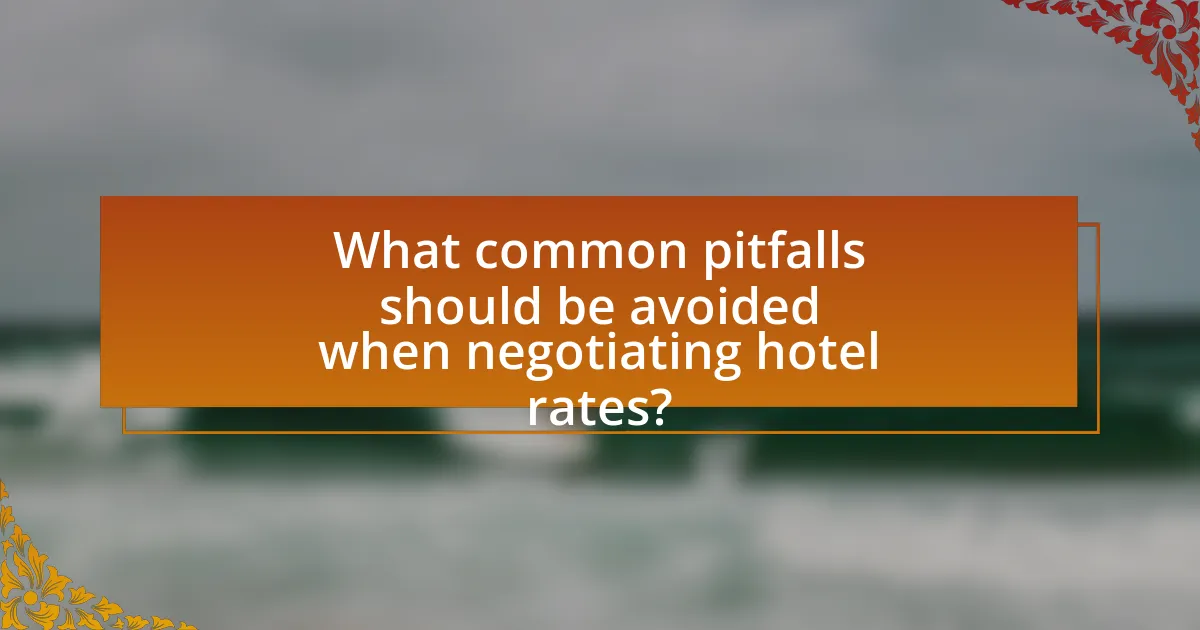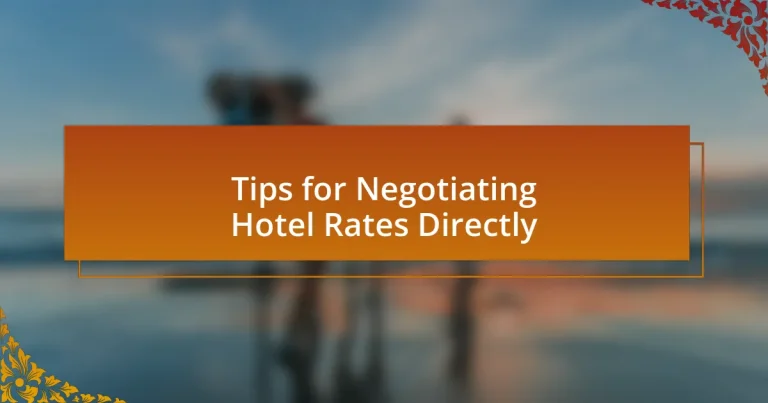The article focuses on effective strategies for negotiating hotel rates directly, emphasizing the importance of research, flexibility, and understanding pricing models. Key strategies include leveraging loyalty programs, timing negotiations during off-peak seasons, and gathering competitor pricing information to strengthen one’s negotiating position. The article also discusses various hotel pricing models, the impact of seasonal trends, and best practices for communication and rapport-building with hotel staff. Additionally, it highlights common pitfalls to avoid and offers techniques for countering initial offers to achieve mutually beneficial agreements.

What are the key strategies for negotiating hotel rates directly?
The key strategies for negotiating hotel rates directly include researching comparable rates, leveraging loyalty programs, and being flexible with dates. Researching comparable rates allows travelers to present evidence of lower prices from competitors, which can encourage hotels to match or beat those rates. Utilizing loyalty programs can provide additional discounts or perks, as hotels often prioritize returning customers. Flexibility with travel dates can lead to better rates, as hotels may offer lower prices during off-peak times or for extended stays. These strategies are effective because they empower travelers with information and options, making them more appealing to hotel management.
How can understanding hotel pricing models enhance negotiation outcomes?
Understanding hotel pricing models can significantly enhance negotiation outcomes by providing insights into the factors that influence pricing, such as demand, seasonality, and competitor rates. When negotiators comprehend these models, they can identify the optimal timing and leverage points for discussions, leading to more favorable terms. For instance, data from STR Global indicates that hotels often adjust rates based on occupancy levels and local events, allowing negotiators to propose deals during off-peak times when hotels are more likely to accept lower rates. This strategic approach not only increases the likelihood of achieving better pricing but also fosters a more informed dialogue between the negotiator and the hotel, ultimately resulting in mutually beneficial agreements.
What are the different pricing models used by hotels?
Hotels utilize several pricing models, including dynamic pricing, fixed pricing, and value-based pricing. Dynamic pricing adjusts rates based on demand, time of booking, and market conditions, allowing hotels to maximize revenue during peak periods. Fixed pricing offers a set rate for a specific period, providing predictability for both the hotel and the customer. Value-based pricing focuses on the perceived value of the hotel experience, allowing rates to reflect the quality of services and amenities offered. These models are supported by industry practices, where dynamic pricing can lead to revenue increases of up to 20% during high-demand seasons, as reported by hospitality analytics firms.
How do seasonal trends affect hotel pricing?
Seasonal trends significantly influence hotel pricing by causing fluctuations in demand throughout the year. During peak seasons, such as summer or holidays, increased demand leads to higher room rates, as hotels capitalize on the influx of travelers. Conversely, during off-peak seasons, demand decreases, prompting hotels to lower prices or offer promotions to attract guests. For instance, a study by STR Global indicates that hotel occupancy rates can vary by as much as 30% between peak and off-peak seasons, directly impacting pricing strategies. This dynamic pricing model allows hotels to maximize revenue based on seasonal demand patterns.
What role does timing play in negotiating hotel rates?
Timing significantly influences the negotiation of hotel rates, as it can determine the availability of rooms and the flexibility of pricing. Hotels often adjust their rates based on demand fluctuations, such as peak seasons, local events, or last-minute bookings. For instance, negotiating during off-peak times can yield better rates, as hotels may be more willing to offer discounts to fill vacancies. Additionally, booking well in advance or at the last minute can also impact pricing; studies show that booking 15 to 30 days in advance typically results in lower rates compared to last-minute bookings, which may be higher due to increased demand.
When is the best time to negotiate hotel rates?
The best time to negotiate hotel rates is during the off-peak season or when hotels have excess inventory. Hotels are more likely to offer discounts when occupancy rates are low, typically during weekdays or outside of major holidays and events. According to a study by STR Global, hotel occupancy rates drop significantly during certain months, making it an ideal time for negotiations. For instance, negotiating in January or February can yield better rates as many travelers are less active during these months.
How does booking in advance versus last minute impact negotiations?
Booking in advance generally provides more leverage in negotiations compared to last-minute bookings. When travelers secure reservations early, they often benefit from lower rates and increased availability, allowing them to negotiate better terms with hotels. For instance, a study by the American Hotel and Lodging Educational Institute indicates that early bookers can save up to 20% on average compared to those who book last minute. Conversely, last-minute bookings may lead to higher prices and limited options, reducing the ability to negotiate effectively. This dynamic is influenced by supply and demand; hotels are more willing to negotiate with early bookers to fill rooms, while last-minute demand can lead to inflated prices.
What information should you gather before negotiating?
Before negotiating hotel rates directly, you should gather information on the hotel’s pricing structure, competitor rates, and your own budget constraints. Understanding the hotel’s pricing structure allows you to identify potential discounts or packages available. Researching competitor rates provides a benchmark for what similar hotels charge, enabling you to negotiate effectively. Additionally, knowing your budget constraints helps you set realistic expectations and limits during the negotiation process. This approach is supported by industry practices where informed negotiation leads to better outcomes for both parties.
How can competitor pricing influence your negotiation strategy?
Competitor pricing significantly influences negotiation strategy by providing a benchmark for acceptable rates and terms. When a hotel is aware of competitor pricing, it can adjust its offers to remain competitive, ensuring that the proposed rates align with market expectations. For instance, if a competitor offers a similar room at a lower price, the hotel may need to either match that price or enhance its value proposition through added amenities or services. This dynamic is supported by market research indicating that 70% of consumers compare prices before making a booking decision, highlighting the importance of competitive awareness in negotiations.
What specific details about the hotel should you research?
To effectively negotiate hotel rates directly, you should research the hotel’s pricing structure, including seasonal rates, discounts, and package deals. Understanding the hotel’s pricing strategy allows you to identify the best times to book and leverage any available promotions. Additionally, investigate the hotel’s amenities, such as free breakfast, parking, or Wi-Fi, as these can influence the overall value of your stay. Researching guest reviews and ratings on platforms like TripAdvisor or Google can provide insights into the hotel’s service quality and customer satisfaction, which may strengthen your negotiating position. Lastly, check for any loyalty programs or affiliations that could offer additional discounts or benefits during your stay.

What tactics can be employed during the negotiation process?
Effective tactics during the negotiation process include preparation, active listening, and establishing rapport. Preparation involves researching market rates and understanding the hotel’s pricing structure, which enables negotiators to present informed arguments. Active listening allows negotiators to grasp the other party’s needs and concerns, facilitating a more collaborative atmosphere. Establishing rapport builds trust, making the other party more likely to consider favorable terms. These tactics are supported by negotiation studies, such as those by Fisher and Ury in “Getting to Yes,” which emphasize the importance of interest-based negotiation strategies.
How can you effectively communicate your needs to hotel staff?
To effectively communicate your needs to hotel staff, clearly articulate your requests and preferences using specific language. For instance, instead of saying “I need a better room,” specify “I would like a room with a king-sized bed and a view.” This clarity helps staff understand your requirements and respond appropriately. Research indicates that direct and specific communication increases the likelihood of receiving satisfactory service, as hotel staff are trained to address explicit requests efficiently.
What are the best practices for initiating a conversation about rates?
The best practices for initiating a conversation about rates include being well-prepared with market research and establishing a clear purpose for the discussion. Preparation involves gathering data on comparable hotel rates in the area, which can provide leverage during negotiations. Additionally, initiating the conversation with a polite and professional tone sets a positive atmosphere, making it easier to discuss rates openly. According to a study by the American Hotel and Lodging Educational Institute, effective communication and preparation significantly enhance negotiation outcomes, leading to better rates for clients.
How can you build rapport with hotel staff to facilitate negotiations?
Building rapport with hotel staff to facilitate negotiations involves establishing a friendly and respectful relationship. Engaging in polite conversation, showing genuine interest in their roles, and expressing appreciation for their assistance can create a positive atmosphere. Research indicates that positive interpersonal interactions can lead to better negotiation outcomes, as rapport fosters trust and cooperation. For instance, a study published in the Journal of Applied Psychology found that rapport-building techniques significantly improved negotiation results by enhancing communication and reducing conflict.
What negotiation techniques can lead to better rates?
Effective negotiation techniques that can lead to better hotel rates include leveraging competitive offers, establishing rapport, and utilizing timing strategically. Leveraging competitive offers involves presenting lower rates from other hotels to encourage the property to match or beat those prices. Establishing rapport with hotel staff can create a more favorable negotiation atmosphere, as personal connections often lead to better deals. Utilizing timing strategically, such as negotiating during off-peak seasons or last-minute bookings, can also result in lower rates, as hotels may be more willing to offer discounts to fill vacancies. These techniques are supported by industry practices that show that personalized interactions and informed negotiations often yield better financial outcomes for consumers.
How can you leverage loyalty programs or memberships in negotiations?
You can leverage loyalty programs or memberships in negotiations by using your status to request additional perks or discounts. For instance, if you are a member of a hotel loyalty program, you can mention your membership level to negotiate for room upgrades, complimentary amenities, or better rates. Research indicates that loyalty program members often receive preferential treatment, with hotels willing to offer incentives to retain loyal customers, as seen in a study by the Cornell University School of Hotel Administration, which found that loyalty program members are more likely to receive favorable terms during negotiations.
What are the advantages of asking for package deals or upgrades?
Asking for package deals or upgrades can lead to significant cost savings and enhanced experiences. Package deals often bundle services such as accommodation, meals, and activities at a lower overall price compared to purchasing each separately. For instance, a study by the American Hotel and Lodging Educational Institute found that guests who booked package deals saved an average of 20% on their total stay. Additionally, requesting upgrades can result in better room quality or additional amenities at no extra cost, as hotels frequently have availability and prefer to accommodate guests to enhance satisfaction and loyalty.
What should you do if the initial offer is not satisfactory?
If the initial offer is not satisfactory, you should counter with a specific request for a better rate or additional perks. This approach allows you to express your interest while indicating that the current terms do not meet your expectations. Research shows that negotiating can lead to better outcomes; for instance, a study by the American Hotel and Lodging Educational Institute found that guests who negotiate can save an average of 10-20% on their bookings. Therefore, presenting a reasonable counteroffer based on market rates or competitor pricing can strengthen your position in the negotiation.
How can you counter an initial offer effectively?
To counter an initial offer effectively, present a well-researched alternative that justifies your request. Begin by analyzing the market rates for similar accommodations, highlighting specific examples of competitive pricing or added value from other hotels. For instance, if the initial offer is $150 per night, but comparable hotels offer similar rooms for $120, use this data to propose a counteroffer of $120, emphasizing the benefits of choosing your preferred hotel. This approach not only demonstrates your knowledge of the market but also provides a solid rationale for your counteroffer, making it more likely to be considered seriously.
What alternatives can you propose to reach a mutually beneficial agreement?
To reach a mutually beneficial agreement in hotel rate negotiations, consider proposing flexible payment terms, such as partial upfront payments or installment plans. This approach can ease the financial burden on both parties and foster goodwill. Additionally, suggest value-added services, like complimentary breakfast or room upgrades, which can enhance the overall experience without significantly impacting the hotel’s bottom line. Research indicates that offering such alternatives can lead to higher satisfaction rates among guests, ultimately benefiting the hotel’s reputation and repeat business.

What common pitfalls should be avoided when negotiating hotel rates?
Common pitfalls to avoid when negotiating hotel rates include failing to do adequate research, not being flexible with dates, and overlooking additional fees. Researching comparable rates and available promotions ensures informed negotiations. Flexibility with travel dates can lead to better rates, as hotels often have varying prices based on demand. Additionally, neglecting to inquire about hidden fees, such as resort fees or parking charges, can result in unexpected costs that undermine the negotiated rate.
What mistakes do travelers often make during negotiations?
Travelers often make the mistake of not doing adequate research before entering negotiations. This lack of preparation can lead to accepting unfavorable rates or terms. For instance, studies show that travelers who compare prices across multiple platforms can save up to 30% on hotel bookings. Additionally, many travelers fail to establish a clear budget or limit, which can result in overspending. Another common error is not being aware of the hotel’s peak seasons or special promotions, which can significantly affect pricing. Lastly, travelers often overlook the importance of building rapport with hotel staff, as a friendly interaction can lead to better deals or upgrades.
How can lack of preparation hinder your negotiation efforts?
Lack of preparation can significantly hinder negotiation efforts by leading to uninformed decisions and missed opportunities. When individuals enter negotiations without adequate research on market rates, competitor offerings, or their own needs, they risk accepting unfavorable terms. For instance, a study by the Harvard Business Review indicates that negotiators who prepare thoroughly are 20% more likely to achieve favorable outcomes compared to those who do not. This lack of preparation can result in an inability to counter offers effectively, reduced confidence during discussions, and ultimately, less favorable agreements.
What are the risks of being overly aggressive in negotiations?
Being overly aggressive in negotiations can lead to damaged relationships and unfavorable outcomes. Aggressive tactics may alienate the other party, causing them to withdraw from the negotiation or refuse to collaborate in the future. Research indicates that 70% of negotiators who employ aggressive strategies report lower satisfaction with the outcome compared to those who use cooperative approaches. Additionally, aggressive behavior can result in a loss of trust, making it difficult to reach mutually beneficial agreements.
How can miscommunication affect the negotiation process?
Miscommunication can significantly hinder the negotiation process by leading to misunderstandings about terms, expectations, and offers. When parties involved in negotiations fail to accurately convey their needs or misinterpret the other party’s statements, it can result in confusion, frustration, and ultimately, a breakdown in negotiations. For instance, a study by the Harvard Business Review highlights that 70% of workplace conflicts arise from miscommunication, which can similarly apply to negotiations, indicating that clear communication is essential for successful outcomes.
What are the signs of miscommunication during negotiations?
Signs of miscommunication during negotiations include inconsistent messages, misunderstandings of terms, and emotional reactions that indicate frustration or confusion. Inconsistent messages occur when parties provide conflicting information or change their positions without clarification, leading to uncertainty. Misunderstandings of terms arise when negotiators interpret language differently, often due to cultural differences or jargon, which can result in misaligned expectations. Emotional reactions, such as visible frustration or defensiveness, signal that one or both parties may not fully grasp the discussion, indicating a breakdown in communication. These signs can hinder effective negotiation and lead to unsatisfactory outcomes.
How can you clarify terms and conditions to avoid misunderstandings?
To clarify terms and conditions and avoid misunderstandings, explicitly outline all terms in clear, concise language. This includes defining key terms, specifying obligations, and detailing any penalties or fees associated with the agreement. Providing a written document that both parties can review ensures transparency and reduces ambiguity. Research indicates that clear communication can significantly decrease disputes; for instance, a study by the Project Management Institute found that 56% of project failures are due to miscommunication. Therefore, using straightforward language and confirming mutual understanding through summaries or follow-up questions can enhance clarity and prevent misunderstandings.
What are the best practices for ensuring a successful negotiation?
The best practices for ensuring a successful negotiation include thorough preparation, clear communication, and establishing a win-win mindset. Preparation involves researching the other party’s needs and interests, which allows for tailored proposals that address their concerns. Clear communication ensures that both parties understand each other’s positions and fosters trust, which is essential for collaboration. Establishing a win-win mindset encourages creative solutions that satisfy both parties, increasing the likelihood of a favorable outcome. According to a study by the Harvard Business Review, effective negotiators who prepare and communicate well achieve better results, demonstrating the importance of these practices in successful negotiations.
How can you follow up after negotiations to confirm agreements?
To follow up after negotiations and confirm agreements, send a concise email summarizing the key points discussed and the agreed-upon terms. This method ensures clarity and provides a written record of the negotiations. Including specific details such as dates, rates, and any special requests reinforces the accuracy of the agreement. According to negotiation experts, written confirmation reduces misunderstandings and solidifies commitments, making it a best practice in professional negotiations.
What strategies can help maintain a positive relationship with hotel staff post-negotiation?
To maintain a positive relationship with hotel staff post-negotiation, consistent communication and appreciation are essential strategies. Regularly expressing gratitude for their assistance fosters goodwill and encourages a collaborative atmosphere. Additionally, providing constructive feedback on services received can help staff understand guest preferences and improve future interactions. Research indicates that positive reinforcement in service industries leads to enhanced employee satisfaction and performance, which in turn benefits guest experiences. By prioritizing these strategies, guests can cultivate lasting, positive relationships with hotel staff.


